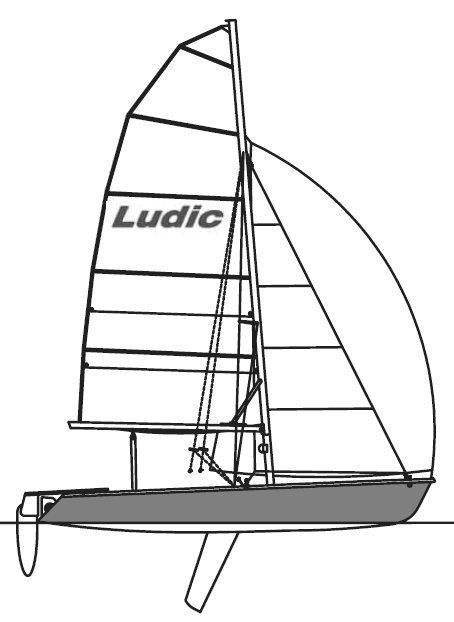The Phileas Ludic is a distinctive 18.37-foot collective dinghy, renowned for its adaptability to group and family sailing. Designed to accommodate up to nine persons, it has become a cornerstone in institutional sailing, particularly favored by sailing schools and clubs for its blend of versatility and the pure joy it offers gliding across the water. This nimble monohull was brought to life by the collaborative design efforts of André Herskovits and Philippe Thomé, and built by Phileas Boats, a French company with a strong reputation for crafting robust, performance-oriented small sailing vessels.
Ludic Information, Review, Specs

- Make
- Model
- Number Built
- Production Year(s)
- 2000 - ??
The Phileas Ludic began production in 2000, emerging from the boatyards of Phileas Boats in Rochefort, France. Established in 1993, Phileas Boats quickly solidified its position as a premier builder of dinghies and sport keelboats, eventually earning the distinction of being a top dinghy constructor in France. The company's design philosophy centers on creating agile, responsive, and durable craft that offer a direct connection with the water and dynamic performance. For the Ludic, designers André Herskovits and Philippe Thomé aimed to create a modern and spacious collective dinghy. Their goal was a vessel easily managed by two, three, or more people, making it an ideal choice for a wide range of users, from large families to sailing organizations. The boat's design notably includes an asymmetrical spinnaker, enhancing its performance characteristics.
Sailing Performance and Handling
The Ludic, with its fiberglass solid hull and fractional sloop rig, is specifically engineered for ease of handling and spirited performance. Its lightweight displacement of 437 lbs and a modest reported sail area of 161 sqft contribute to its agile nature. Equipped with a centerboard and a single rudder, the Ludic is designed for dynamic sailing, promising the "pleasure of gliding on the water." Anecdotal evidence suggests it is considered a simple and safe dinghy to helm, making it particularly suitable for teaching and group activities. Its design as a collective dinghy, capable of carrying multiple crew members, underscores its stable and predictable behavior, even with varied loads, which is crucial for its role in sailing schools and family outings.
Accommodations and Layout
As a collective dinghy, the Phileas Ludic prioritizes open cockpit space and functionality over enclosed living accommodations. With a length overall of 18.37 feet and a beam of 6.23 feet, the design focuses on maximizing the area available for crew. It is described as "spacious" in the context of an open dinghy, providing ample room for up to nine persons. The layout is entirely geared towards on-deck activity, whether for recreational sailing or structured training. There are no traditional interior cabins, galleys, or heads; instead, the emphasis is on a robust, open deck arrangement constructed from fiberglass, facilitating easy movement, safety, and durability in high-use environments. While not offering overnight comforts, the Ludic's layout is perfectly suited for its intended purpose as a versatile day sailor and training vessel.
Measurements
Construction & Hull
- Construction Material
- Fiberglass (Solid)
- Hull Type
- Monohull Sailboat
- Keel Type
- Centerboard
- Rudder
- 1x —
- Ballast
- 143 lbs
- Displacement
- 437 lbs
- Water Capacity
- -
- Fuel Capacity
- -
Engine
- Engine Make
- —
- Engine Model
- —
- Engine Type
- —
- Engine HP
- —
- Engine Count
- 1
- Drive Type
- —
- Fuel Type
- —
Rig & Sails
- Rig Type
- Fractional Sloop
- P (Main Luff)
- -
- E (Main Foot)
- -
- I (Foretriangle Height)
- -
- J (Foretriangle Base)
- -
- Forestay Length (est)
- -
- Main Sail Area
- -
- Foretriangle Sail Area
- -
- Total Sail Area (Reported)
- 161 sqft
- Total Sail Area (Calc)
- -
Dimensions
- LOA
- 18.37 ft
- LWL
- -
- Beam
- 6.23 ft
- Draft
- -
- Max Headroom
- -
- Air Draft
- -
Calculations
- Hull Speed
- — kn
- Pounds per Inch Immersion
- —